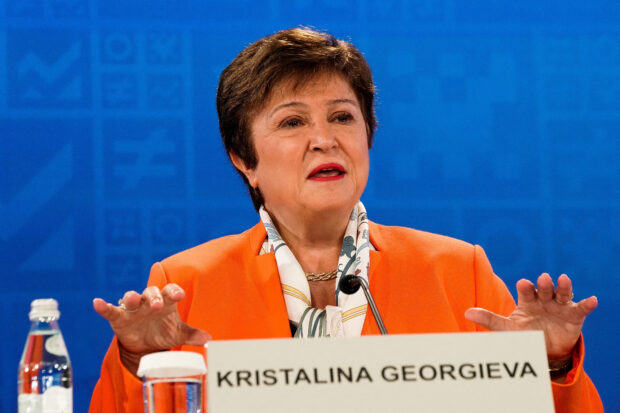IMF’s Georgieva sees risk of supply chain security leading to new Cold War

International Monetary Fund (IMF) Managing Director Kristalina Georgieva holds a news conference during the 2023 Spring Meetings of the World Bank Group and the International Monetary Fund in Washington, U.S., April 13, 2023. REUTERS/Elizabeth Frantz
WASHINGTON -International Monetary Fund Managing Director Kristalina Georgieva on Thursday warned policymakers against the danger of a new Cold War as they ramp up efforts to secure their industrial supply chains amid geopolitical tensions between major powers.
“The question is, can we be more determined to enhance security of supplies but not push the world that far that we are into a second Cold War?” Georgieva told a news conference at the IMF and World Bank spring meetings in Washington. “I believe it is possible.”
Georgieva, who grew up in Bulgaria during the Soviet era, said she experienced the Cold War and its impact in cutting off talented people from the world economy, and didn’t want to see that repeated.
On Wednesday, Group of Seven (G7) finance leaders pledged to give low- and middle-income countries a bigger role in diversifying supply chains to make them more resilient and sustainable.
https://business.inquirer.net/395640/g7-finance-leaders-pledge-financial-stability-supply-chain-diversity
Their communique did not mention China by name, but the supply chain language fit in with “friend-shoring” efforts championed by U.S. Treasury Secretary Janet Yellen and other Western leaders to trade more with allies and become less reliant on the Asian manufacturing powerhouse for battery minerals, semiconductors and other strategic goods.
The IMF has warned that rising geopolitical tensions and the resulting fragmentation of the global economy could increase financial stability risks and potentially reduce global economic output by between 0.2 percent and 7 percent.
It’s one of the key reasons that the IMF predicts the global economy will stay mired in low-growth mode for years.
Georgieva said policymakers might have to accept that development of new, more separated supply chains would involve some cost.
“Security of supplies and the reliable functioning of global supply chains is taking a new, higher priority seat in economic discussions,” she said, citing the impact of both the COVID pandemic and the war in Ukraine. But she warned against going overboard and harming global trade flows.
“If we fail to be more rational, then people everywhere would be worse off. The middle class in each country would pay a price,” Georgieva said. “So a bit more cool-headedness would take us a long way.”
De-risking or de-coupling?
The IMF has long warned of increased costs, economic friction associated with the global economy fragmenting into geopolitical blocs, with U.S.-led democracies on one side and China and other autocratic states on another. This can lead to competing technology systems and reduced trade. A new IMF working paper showed such rising tensions could also drive outflows of cross-border capital, including direct investment, from countries, with particularly high risks for developing and emerging market economies.
But French Finance Minister Bruno Le Maire said it was important for France, the European Union and the United States to secure supply chains for crucial goods like electric vehicle batteries and reduce their dependence on China. But he drew a distinction between “de-risking” supply chains and “de-coupling” from China.
“I think that we need to engage China if we want to craft responses to the greatest challenges of the 21st century,” including climate change and debt relief, he said.
A senior U.S. Treasury official said that China also was contributing to fragmentation by keeping vast sectors of its economy off limits to foreign competition.
“They are moving in a direction that is closing off the world and bifurcating themselves from things like the market-oriented policies that allowed them to rise so rapidly,” the official said of China.
The IMF is forecasting a strong rebound in China in 2023 given its post-COVID opening, and it will account for about one-third of global growth this year, Georgieva said.
READ MORE:
Airspace closures after Ukraine invasion stretch global supply chains
Global supply chains buckle as virus variant and disasters strike
Biden and Xi clash over Taiwan in Bali but Cold War fears cool